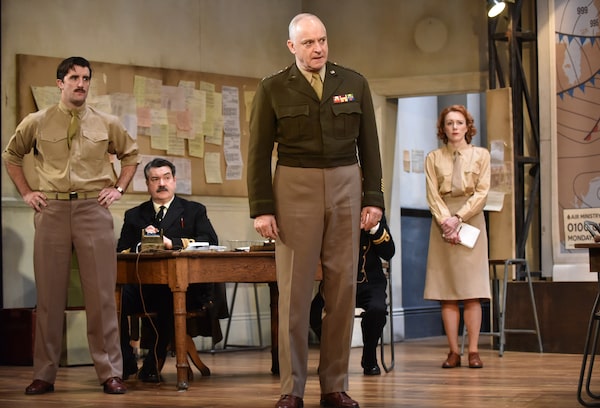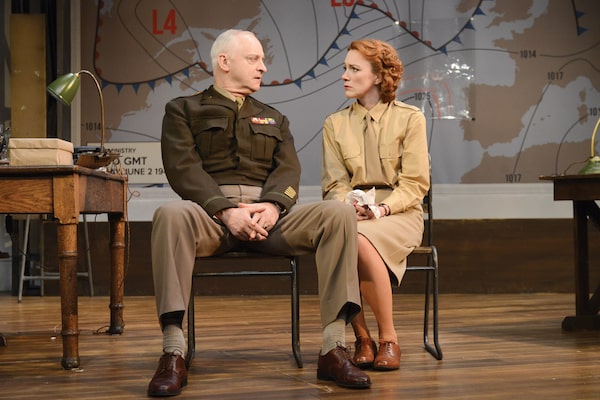
From the left: Philip Cairns, Mark Jax, Malcolm Sinclair and Laura Rogers in David Haig's Pressure, at the Royal Alexandra Theatre.Robert Day/Mirvish
Keep up to date with the weekly Nestruck on Theatre newsletter. Sign up today.
- Title: Pressure
- Written by: David Haig
- Directors: John Dove and Josh Roche
- Actors: Kevin Doyle, Laura Rogers, Malcolm Sinclair
- Company: Mirvish Productions
- Venue: Royal Alexandra Theatre
- City: Toronto
- Year: To March 5, 2023
Weather forecasters are not the most trusted figures at the best of times. So imagine being the weatherman who had to convince the Allied command to postpone D-Day, the massive sea-and-air invasion that turned the tide of the Second World War, based on the prediction of a possible storm.
That would be Scottish meteorologist Dr. James Stagg, whose daring forecast led the Allies to move D-Day, at tremendous risk, from June 5 to June 6, 1944.
Stagg is the unlikely hero of Pressure, the blustery British wartime drama now unfolding at Toronto’s Royal Alexandra Theatre. And for this, the play’s North American premiere, he’s embodied by an unlikely actor – Kevin Doyle, best known as the mild-mannered servant Joseph Molesley of TV’s Downton Abbey.
Doyle’s Stagg, in contrast, is brusque and peevish, blowing in like a cold front as he takes over the shabby room in England’s Southwick House, the Allied headquarters, where he’s expected to track the weather in advance of the invasion. He fits that favourite Scottish adjective, “dour,” as snugly as his rival, hotshot U.S. meteorologist Colonel Irving P. Krick (Philip Cairns), sports the American epithet “brash.”
But wait for it: David Haig’s play is as much about deceptive appearances as it is about the dodgy British climate that bedevilled the Allied generals. Acted by a top-notch cast, it makes for a fitfully intense but frequently entertaining history lesson.
Stagg has been brought into Operation Overlord (the codename for the Normandy invasion) in a spirit of Allied co-operation, even though the supreme commander, General Dwight D. “Ike” Eisenhower (Malcolm Sinclair), already has a preferred prognosticator in Krick. The latter arrives flaunting his Hollywood credentials, having provided a successful forecast for the spectacular “burning of Atlanta” scene in Gone with the Wind. He’s predicting fair weather for the June 5 landings.
Stagg, however, has his doubts. Based on his studies of the jet stream – a new concept at the time – he’s afraid a huge storm is heading toward the English Channel, making the crossing by some 7,000 navy vessels all but impossible. The stakes are high: For want of a correct forecast, the invasion could be lost. For want of the invasion… well, the prospect of an ultimate victory for Adolf Hitler and Nazi Germany is too horrible to contemplate.
As Eisenhower is torn between his two competing weathermen, Stagg finds unexpected support from the general’s right-hand woman, Lieutenant Kay Summersby (Laura Rogers). Although they get off to a chilly start, she warms to Stagg after he confides to her that he’s under added pressure, with his wife due to give birth to their second child any day now.
Once Stagg begins to drop his guard and reveal his anxieties, Doyle taps into some of that low-key sincerity that made Molesley such a likable chap. His Stagg becomes more human with each passing scene and there’s a lovely moment when he describes how his childhood wonder at clouds and the rain led to his present vocation.

Sinclair and Rogers have been in Pressure since its debut.Robert Day/Mirvish
Rogers, meanwhile, is superb as Summersby, the self-described “dogsbody” who acts as secretary, chauffeur, mechanic and – this being the 1940s – is also expected to serve the men their tea. She radiates a brisk efficiency that masks her vulnerability, particularly when it comes to her romantic feelings for Eisenhower.
As the general (and future U.S. president), Sinclair is the epitome of the gruff, tough American military man – at times he recalls the great George C. Scott in his Patton and Dr. Strangelove roles. Sinclair’s Ike chain-smokes Chesterfields, favours football metaphors and speaks with shiny-eyed pride about his men in the 101st Airborne Division. But playwright Haig has also given him a soft side, which Sinclair brings out nicely in an intimate scene with Rogers, where Ike and Kay share a rare wartime treat – an orange.
Haig, an actor himself, originally portrayed Stagg when Pressure premiered in 2014 as a co-production between Edinburgh’s Royal Lyceum Theatre and the Chichester Festival Theatre. The play has since toured the U.K. and had a 2018 run in London’s West End, with many of the same cast members as the current show. Indeed, Rogers and Sinclair have been with it since its debut. That’s reflected in their assured performances, while newcomer Doyle at times feels like he’s not quite settled into the role of Stagg.
He has an amusing antagonist in Cairn’s over-confident Krick, whose moustache and swagger suggest a cut-rate Clark Gable. Among the other supporting players, David Killick provides additional comic relief in his turn as a garrulous electrician confined to Southwick House in case his loose lips sink ships.
Directors John Dove and Josh Roche slowly, steadily build the tension as the days and hours tick down to what may, or may not, be D-Day. But the play’s tempestuous climax is followed by a long stretch of calm in which the story loses its momentum. However, there’s no faulting Colin Richmond’s period-perfect design, his set dominated by a giant upstage board with changing weather charts.
Through an open window, Tim Mitchell’s lighting and Philip Pinsky’s sound artfully evoke the weather itself. If nothing else, Pressure will remind you of the complexities of forecasting the next time you’re tempted to grumble about an inaccurate weather report. It may also give you pause when you consider that the fate of the free world once rested on the slumping shoulders of a middle-aged meteorologist.
In the interest of consistency across all critics’ reviews, The Globe has eliminated its star-rating system in film and theatre to align with coverage of music, books, visual arts and dance. Instead, works of excellence will be noted with a critic’s pick designation across all coverage. (Television reviews, typically based on an incomplete season, are exempt.)